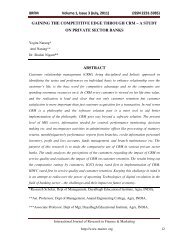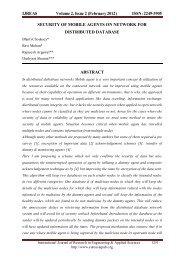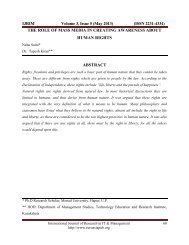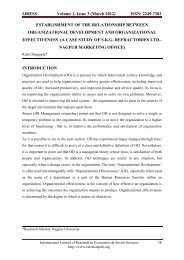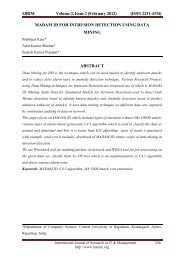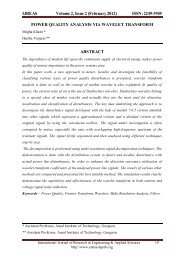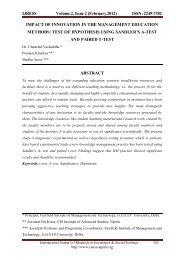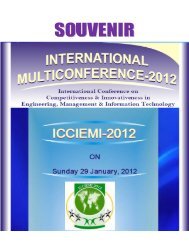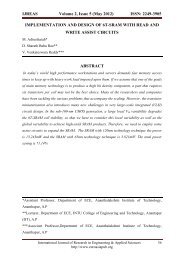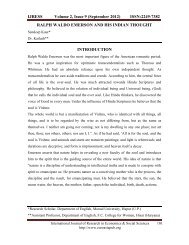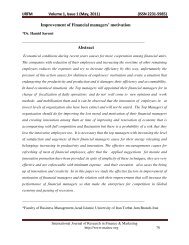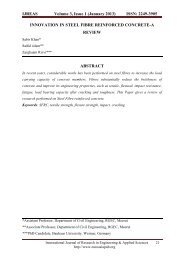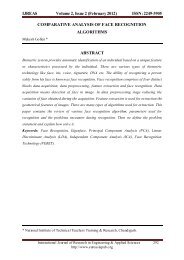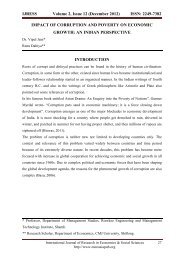the mayor and tess: mounting will, dismounting fate elements of fate ...
the mayor and tess: mounting will, dismounting fate elements of fate ...
the mayor and tess: mounting will, dismounting fate elements of fate ...
You also want an ePaper? Increase the reach of your titles
YUMPU automatically turns print PDFs into web optimized ePapers that Google loves.
IJREAS Volume 3, Issue 6 (June 2013) ISSN: 2249-3905“Here is not merely <strong>the</strong> tragedy <strong>of</strong> a heroic girl, but <strong>the</strong> tragedy <strong>of</strong> a proud community baffled<strong>and</strong> defeated by a process beyond its underst<strong>and</strong>ing control”. (90).What makes this novel a tragic story is not <strong>the</strong> involvement <strong>of</strong> Tess's fine spirit in a degradingstory <strong>of</strong> reduction <strong>and</strong> revenge. Ra<strong>the</strong>r, it is <strong>the</strong> meaningfulness <strong>of</strong> life considered as <strong>the</strong> story <strong>of</strong>a victim <strong>of</strong> her <strong>will</strong> <strong>and</strong> a scapegoat. J.R. Brooks places <strong>the</strong> story as, "<strong>the</strong> surface story <strong>of</strong> Tessnarrates <strong>the</strong> events that defeat her struggle for <strong>the</strong> personal happiness. But <strong>the</strong> poetic underpatternreveals <strong>the</strong> resolute purpose <strong>of</strong> <strong>the</strong> victim <strong>of</strong> circumstances <strong>and</strong> <strong>the</strong> doomed or sanctifiedbeing a more archetypal direction to her life hostile to personal claims" (439). In consideringTess as a victim <strong>of</strong> her own <strong>will</strong> <strong>and</strong> circumstances, <strong>the</strong> following pattern needs to be considered:(1) The society in which Tess suffers <strong>and</strong> die is sick with evil: it worships <strong>the</strong> false idol <strong>of</strong>chastity <strong>and</strong> is committed to a set <strong>of</strong> attitudes toward <strong>the</strong> fallen woman <strong>and</strong> toward sexuality ingeneral which are unnatural <strong>and</strong> harmful in extreme (2). Tess's sufferings, which arise in <strong>and</strong> arecaused by this social context, are at <strong>the</strong> very centre <strong>of</strong> attention, <strong>and</strong> <strong>the</strong> novel is to a great extentis simply <strong>the</strong> story <strong>of</strong> her sufferings (3) These are no villains, no really evil characters –Alec onesAngel, who between <strong>the</strong>m destroy Tess, are merely mediators <strong>of</strong> attitudes, habits <strong>and</strong> valuespresent in <strong>the</strong>ir society. (4) Tess’s suffering produces a good – if not <strong>the</strong> immediate regeneration<strong>of</strong> <strong>the</strong> society, at least <strong>the</strong> regeneration <strong>of</strong> Angel Clare, who spoke <strong>and</strong> acted for <strong>the</strong> conventions<strong>of</strong> society <strong>and</strong> who is said to be sample product <strong>of</strong> <strong>the</strong> last five <strong>and</strong> twenty years" (Tess, 235).Tess is so devastated between Alec <strong>and</strong> Angel in terms <strong>of</strong> mind <strong>and</strong> spirit that Angel, returningtoo late to find her installed in <strong>the</strong> lodging house as Alec's mistress, realizes that his original Tesshad spiritually ceased to recognizing <strong>the</strong> body before him as Tess <strong>the</strong> body before him as Tessallowing it to drift, like a corpse upon <strong>the</strong> current in a direction dissociated from its living <strong>will</strong>"(Tess,484).Though <strong>the</strong> novel is essentially <strong>the</strong> tragedy <strong>of</strong> characters who are <strong>the</strong> victims <strong>of</strong> <strong>fate</strong> or scapegoatbut this does not mean that <strong>the</strong> central figure is merely weak <strong>and</strong> helpless. On <strong>the</strong> contrary,though Tess's circumstances make her a victim, her nature is courageous <strong>and</strong> heroic. MechaelMillgate evaluates, “Tess may essential a <strong>the</strong> victim <strong>and</strong> we from an early stage feel that she isdoomed, if only because <strong>of</strong> what myths, ballads <strong>and</strong> melodramas have taught us to anticipate as<strong>the</strong> life pattern <strong>of</strong> <strong>the</strong> reduced country maiden" (279).It can be stated that Tess's sufferings are strongly emphasized in <strong>the</strong> novel. Nearly half <strong>of</strong> <strong>the</strong>novel is devoted to describing <strong>the</strong> instances <strong>of</strong> rejection, ostracism, misfortune <strong>and</strong> hard timesInternational Journal <strong>of</strong> Research in Engineering & Applied Sciences 46http://www.euroasiapub.org



